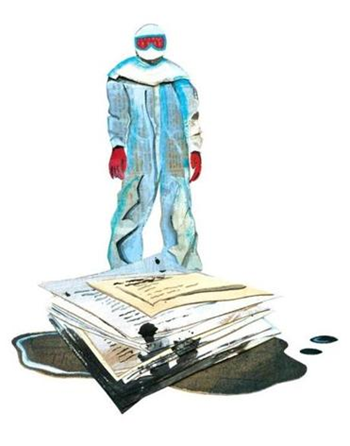 By Christopher Reddy and Richard Camilli, Woods Hole Oceanographic Institution
By Christopher Reddy and Richard Camilli, Woods Hole Oceanographic Institution
3 June 2012 Late last week, we reluctantly handed over more than 3,000 confidential e-mails to BP, as part of a subpoena from the oil company demanding access to them because of the Deepwater Horizon disaster lawsuit brought by the US government. We are accused of no crimes, nor are we party to the lawsuit. We are two scientists at an academic research institution who responded to requests for help from BP and government officials at a time of crisis. Because there are insufficient laws and legal precedent to shield independent scientific researchers, BP was able to use the federal courts to gain access to our private information. Although the presiding judge magistrate recognized the need to protect confidential e-mails to avoid deterring future research, she granted BP’s request. It is the lack of legal protection that has us concerned. The 2010 Deepwater Horizon disaster caused the death of 11 people and spilled oil at an unprecedented depth of nearly a mile under the Gulf of Mexico. That deep-sea environment was aqua incognita to the oil industry and federal responders, but a familiar neighborhood for us at Woods Hole Oceanographic Institution. BP and Coast Guard officials asked for our help to assess the disaster, and we obliged. We responded by leading on-site operations using robotic submersibles equipped with advanced technologies that we had developed for marine science. We applied them to measure the rate of fluid release from the well and to sample fluids from within the well. We then volunteered our professional time to scrutinize this data and published two peer-reviewed studies in a respected scientific journal. We determined an average flow rate of 57,000 barrels of oil per day and calculated a total release of approximately 4.9 million barrels. BP claimed that it needed to better understand our findings because billions of dollars in fines are potentially at stake. So we produced more than 50,000 pages of documents, raw data, reports, and algorithms used in our research — everything BP would need to analyze and confirm our findings. But BP still demanded access to our private communications. Our concern is not simply invasion of privacy, but the erosion of the scientific deliberative process. Deliberation is an integral part of the scientific method that has existed for more than 2,000 years; e-mail is the 21st century medium by which these deliberations now often occur. During this process, researchers challenge each other and hone ideas. In reviewing our private documents, BP will probably find e-mail correspondence showing that during the course of our analysis, we hit dead-ends; that we remained skeptical and pushed one another to analyze data from various perspectives; that we discovered weaknesses in our methods (if only to find ways to make them stronger); or that we modified our course, especially when we received new information that provided additional insight and caused us to re-examine hypotheses and methods. In these candid discussions among researchers, constructive criticism and devil’s advocacy are welcomed. Such interchange does not cast doubt on the strengths of our conclusions; rather, it constitutes the typically unvarnished, yet rigorous, deliberative process by which scientists test and refine their conclusions to reduce uncertainty and increase accuracy. To ensure the research’s quality, scientific peers conduct an independent and comprehensive review of the work before it is published. A byproduct of the order to hand over our e-mails is that BP now has access to the intellectual property attached to the e-mails, including advanced robotic navigation tools and sub-sea surveillance technologies that have required substantial research investment by our laboratories and have great economic value to marine industries such as offshore energy production. The court provides no counterbalancing legal assistance to verify that BP or its affiliates do not infringe on our property rights. […]
Science out of context
By Christopher Reddy and Richard Camilli, Woods Hole Oceanographic Institution